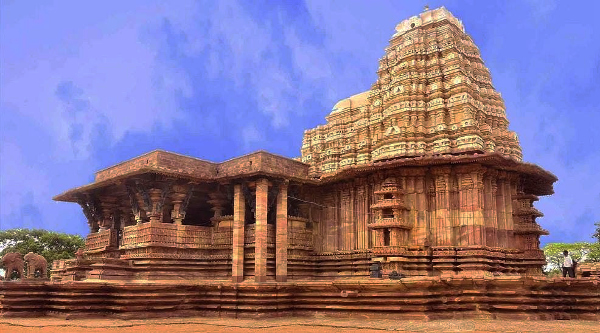Construction of the Ram temple at Ayodhya won’t be completed before 2025 though devotees may be allowed to visit and pray at the partially built structure by December 2023, sources involved in the construction of the temple told The Indian Express.
“We are hoping to complete the main garbha griha (sanctum sanctorum) and the first floor of the temple by December 2023. This will help devotees visit and offer prayers to Ram Lalla,” a source said.
Sources also said the bricks collected by kar sevaks from across the country at the peak of the Ram temple movement may not be used in the construction of the temple. Besides, only about 70 per cent of the carved stones at Karsevakpuram, the VHP-run workshop in Ayodhya, will be utilised.
“The main temple is going to be a complete stone structure. So those bricks, which do not have the composite strength required, cannot be used in the main temple. However, we are aware of their importance, given the devotee sentiment attached to these bricks, and will use them elsewhere in the temple complex,” said a source.
In 1989, at the peak of the temple agitation, kar sevaks had collected bricks or shilas inscribed with ‘Sri Ram’ in various languages from villages and homes across the country. These bricks, meant to be used for the construction of the temple whenever it came up, have been lying at Karsevakpuram for over three decades. Also at the Karsevakpuram workshop, artisans have been carving stones for use in the proposed temple.
The source involved in the construction of the temple added that of the 40,000 cubic feet of carved stones at Karsevakpuram, the Ram Temple Construction Committee has decided to use “as much as possible” and align the new carvings with those at the workshop.
“Still, we will not be able to use more than 70 per cent of the old carvings as the temple requires a specific strength to its structure,” he said.
The Ram Temple Construction Committee is headed by Nripendra Misra, former principal secretary to the PM.
Sources said fresh stones for the temple construction are being brought from Banshi Paharpur in Rajasthan. Mining of the pink sandstone there had been stopped on court orders but has resumed now.
Sources said no steel will be used on the temple structure for fear of corrosion; instead, copper will be used.
While devotees may be allowed in by December 2023, just ahead of Lok Sabha elections in 2024, the temple won’t be fully ready before 2025.
Sources said the temple construction was taking time as the “soil at the site is not suitable for a grand structure”.
They said that with a lot of time spent testing the soil and excavating the site, the actual work could begin only in March. A committee of engineers, with members drawn from various IITs, found the site to have “too much debris under the soil”.
“The committee report said the debris was 12 metres deep. So the foundation had to be that deep. Then the Trust wanted the temple to be constructed the traditional way. So modern-day vibro piles, as suggested by engineers, could not be used. The other way was to excavate up to the depth of a three-storey building and fill it with stones. Finally, the second option was approved by the Trust,” the source said.
Around 70 lakh cubic feet of soil was excavated from the site, a source said.
“Experts suggested filling the site with engineered fill (a combination of fly ash and cement). This work is going on with 140 trucks carrying the fill from Mahoba and Jhansi to Ayodhya every day. This foundation will give the temple longevity of several hundred years. On the foundation, there will be a 7-ft raft and then there will be a plinth of 16 feet before the stone structure is erected,” the source said.
He added the total ‘engineered fill’ required for the site is 1.25 lakh cubic metres, of which 71,000 cubic metres have been filled.
They said the total cost of construction is estimated to be Rs 1,000 crore and the temple complex is likely to be spread across 110 acres, for which around 45 acres are yet to be acquired. The acquisition work is being carried out by the Ram Janmabhoomi Teertha Kshetra Trust headed by VHP leader Champat Rai.
The Trust is said to have already collected close to Rs 3,000 crore in donations from India alone. Since it is yet to get clearance from the government under the Foreign Contribution (Regulation) Act, foreign donations are not being accepted, sources said.
The temple complex will also have a museum with copies of the Ramayana from across the globe and documents related to the history of the temple and legal issues associated with it.
You may also like
-
The Recently Retrieved Idol of Goddess Annapurna to Begin itsJourney on November 11 for its Rightful Place at Kashi Vishwanath Temple, Varanasi
-
Sun Rays Will Illuminate Ram Temple’s Sanctum Sanctorum Every Ram Navami
-
PM Expresses Happiness on UNESCO Declaring Kakatiya Ramappa Temple A World Heritage Site
-
Government to Set Up A World-Class ‘Indian Institute of Heritage’ at Noida to focus on Conservation and Research in India’s Rich Tangible Heritage
-
Shital Nath Temple in Kashmir Reopened for Devotees After 31 Years
